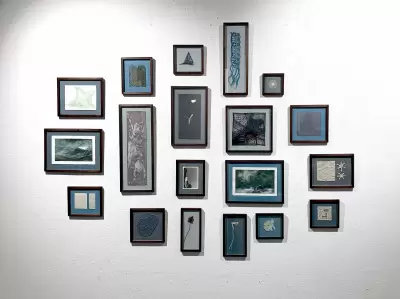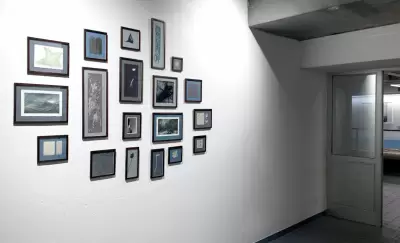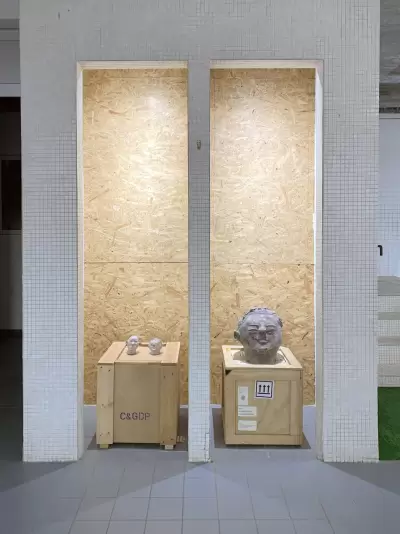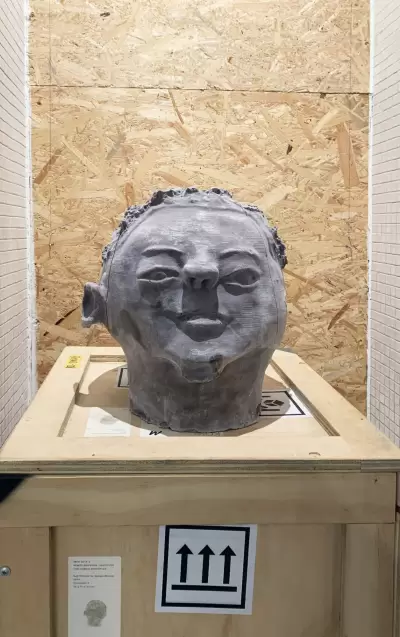



Info
A new exploration of the De Pietri Artphilein Foundation’s collection, remaining connected to the African continent, brings to light the works of two artists, Pierre Fouché and Renzo Martens, who share a focus on decolonization, the desire for emancipation and liberation from prejudices, and, above all, the use of unconventional techniques.
Pierre Fouché defines himself as a lacemaker artist. With determination, he has embraced a craft traditionally considered predominantly feminine and has mastered the ancient techniques of embroidery in all their complexity. He has extensively studied the history of textiles, the manufacturing processes, and the histories of violent usurpation connected with the cultivation of essential raw materials and subsequent manufacturing. His expertise now allows him to transcend the notion of craftsmanship and use embroidery as one of his expressive means to create art on politically, socially, and queer-relevant themes.
The Lacemaker’s Notebook (2012) includes drawings, patterns, and lace samples along with various objects, and in the artist’s words: “It is a subtle institutional critique of aesthetic hierarchies, of craftsmanship, and a document of my initial apprenticeship as a lacemaker and visual artist.” Through nautical references, Fouché alludes to modern optical experiments and the capturing of the transience of light: the sea serves as a metaphor for time, desire, the search for identity, and the awareness of one’s own mortality.
Renzo Martens exposes, in addition to the exploitation of natural resources, the inefficacy of Western contributions in fighting poverty in developing countries and the perversions of the art world. According to Martens, the staging of poverty, as in the case of Congo, constitutes a profitable industry, generating revenues even greater than those from traditional exports (gold, diamonds, cocoa, etc.). However, like the benefits from raw material exports, development aid received by the Congolese state also remains in the hands of a few. The poor remain perpetual victims, first of colonization and now of decolonization. Martens’ critique also targets the art world, where plantation owners assume the role of patrons and reinvest part of their profits—gained through aggressive cultivation practices and labor exploitation—into building museums and purchasing artworks.
In 2012, the artist founded the Institute for Human Activities (IHA) at the KASK/School of Arts at University College Ghent in Belgium, where he and his collaborators planned their mission in Congo and from where they continue to direct it. For over a decade, the IHA has collaborated with the Cercle d’Art des Travailleurs de Plantation Congolaise (CATPC), a group of farmer-artists, artists, and low-wage ecologists based in Lusanga, a small town in the Democratic Republic of Congo. Here in 1911, the Lever Brothers (later Unilever) established their first palm oil plantation. CATPC and IHA run an art and research center that uses the proceeds from the sale of their artworks to buy back land exploited by Unilever.
There are three sculptures on display: the two smaller ones, both titled Self-portrait and created respectively by Daniel Manenga Kibwila (2014) and Djonga Bismar (2014), and finally the larger one, also titled Self-portrait by Djonga Bismar (2014). After being created within the CATPC, they were digitized with a 3D scanner in Lusanga and cast in chocolate (using cocoa from African plantations) in Amsterdam, the world’s largest cocoa port.
Pierre Fouché (1977, Pretoria, South Africa) earned a Master’s in Fine Arts from Stellenbosch University in 2006. In 2021, he represented South Africa at the Indian Ocean Craft Triennale in Perth. In 2018, he participated in the 12th Textile and Glass Symposium in the Andorran city of Escaldes-Engordany. Notable group exhibitions include Lace/not lace at the Hunterdon Art Museum in Clinton, New Jersey; Crafted: Objects in Flux at the Boston Museum of Fine Arts (2018); Women’s Work at the Iziko South African National Gallery (2016); as well as the traveling exhibition Queer Threads: Crafting Identity and Community, first shown at the Leslie + Lohman Museum of Gay and Lesbian Art in New York (2015). His work is held in the public collections of the Iziko South African National Gallery, the Norval Foundation, the A4 Art Foundation, and the Artphilein Foundation in Switzerland.
Renzo Martens (1973, Terneuzen, Netherlands) is an artist and filmmaker currently living and working between Amsterdam and Lusanga. He studied Political Science at Nijmegen University, Netherlands (1992), earned an MA at the Gerrit Rietveld Academy in Amsterdam (1996), and a PhD in Arts at Ghent University, Belgium. He gained international recognition with the films Episode I (2003) and Episode III: Enjoy Poverty (2009), particularly the latter, which was broadcast in over 23 countries. In 2012, Martens founded Human Activities and its Gentrification Program in the Democratic Republic of Congo. In 2017, he opened White Cube, a museum designed by OMA on a former Unilever plantation in Lusanga.